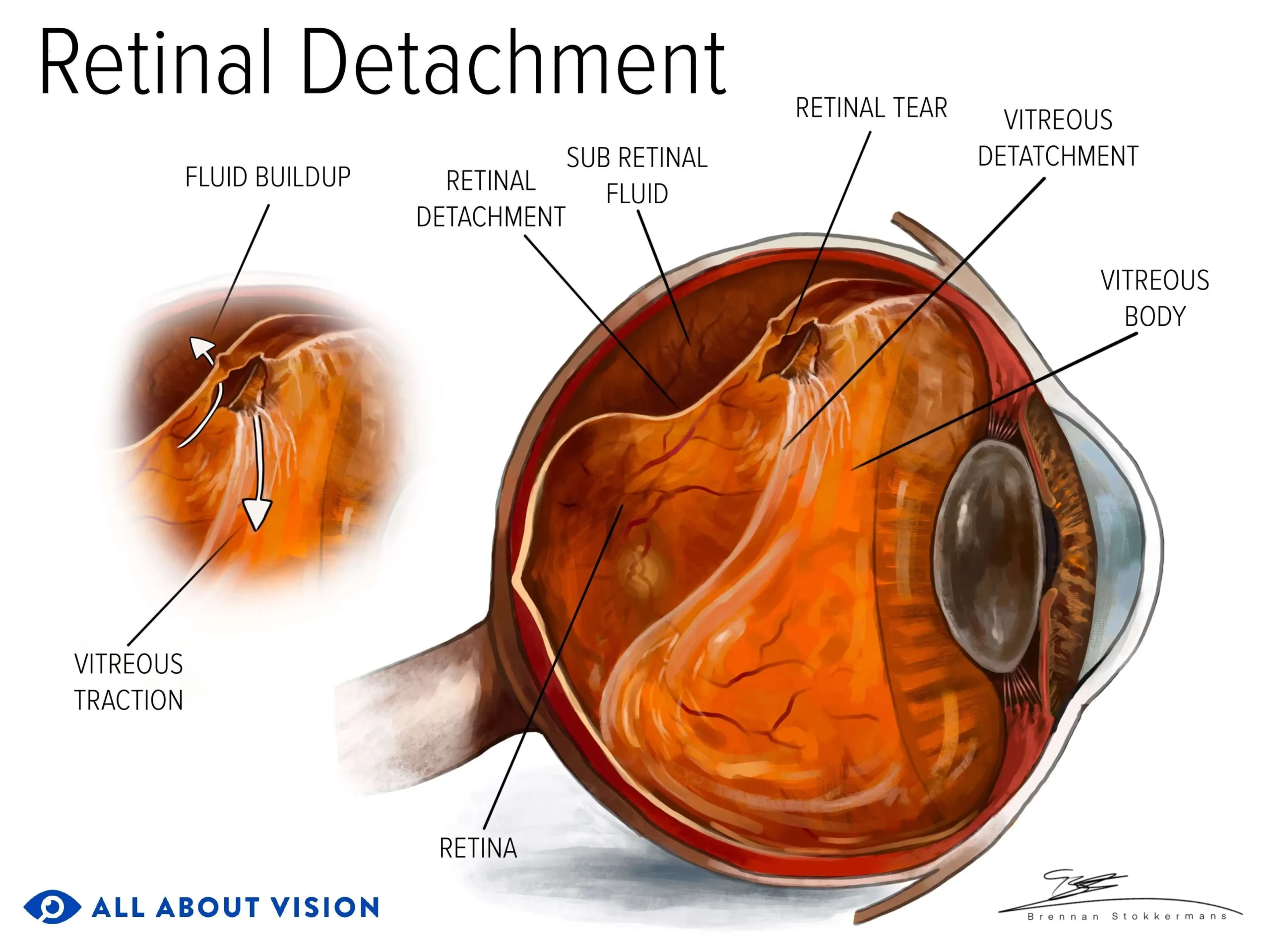
What is Retinal Detachment and How is It Treated?
Introduction
Retinal detachment is a serious eye condition that can lead to permanent vision loss if not treated promptly. It occurs when the retina, the light-sensitive layer of tissue at the back of the eye, separates from its underlying supportive tissue. This blog post will explore the causes, symptoms, and treatment options for retinal detachment.
Understanding Retinal Detachment
The retina plays a crucial role in vision by converting light into electrical signals, which are then sent to the brain. When the retina detaches, it loses its connection to the blood vessels that supply it with oxygen and nutrients, leading to potential vision loss.
Causes of Retinal Detachment
Retinal detachment can be caused by several factors, including:
1. Aging
As we age, the vitreous gel in the eye can shrink and pull away from the retina, leading to tears or holes that can result in detachment.
2. Eye Injuries
Trauma to the eye can cause the retina to detach. This includes injuries from accidents, sports, or other physical impacts.
3. Previous Eye Surgery
Surgeries such as cataract removal can increase the risk of retinal detachment.
4. Myopia (Nearsightedness)
People with severe myopia have longer eyeballs, which can stretch and thin the retina, making it more prone to detachment.
5. Family History
A family history of retinal detachment can increase the risk of developing the condition.
Symptoms of Retinal Detachment
Retinal detachment is a medical emergency, and recognizing the symptoms early is crucial. Common symptoms include:
1. Sudden Appearance of Floaters
Floaters are small, dark spots or shapes that appear in your vision. While common with aging, a sudden increase in floaters can indicate retinal detachment.
2. Flashes of Light
Seeing flashes of light, especially in peripheral vision, can be a sign of retinal detachment.
3. Shadow or Curtain Over Vision
A shadow or curtain-like effect that moves across your field of vision is a classic symptom of retinal detachment.
4. Blurred Vision
Sudden and unexplained blurred vision can also be a symptom.
Diagnosis of Retinal Detachment
If you experience any of these symptoms, it is essential to seek immediate medical attention. An eye doctor will perform a thorough eye examination, including:
1. Dilated Eye Exam
Drops are used to widen your pupils, allowing the doctor to examine the retina more thoroughly.
2. Ultrasound Imaging
If the retina cannot be clearly seen, an ultrasound may be used to check for detachment.
Treatment Options for Retinal Detachment
The treatment for retinal detachment often involves surgery. The choice of surgery depends on the severity and type of detachment. Common procedures include:
1. Laser Surgery (Photocoagulation)
This procedure uses a laser to create small burns around the retinal tear, sealing it to the back of the eye and preventing detachment.
2. Cryopexy (Freezing)
A freezing probe is applied to the outer surface of the eye, creating a scar that helps reattach the retina.
3. Pneumatic Retinopexy
A gas bubble is injected into the eye, which presses the retina back into place. Laser or cryopexy is then used to seal the tear.
4. Scleral Buckling
A flexible band (buckle) is placed around the eye to counteract the force pulling the retina out of place.
5. Vitrectomy
The vitreous gel pulling on the retina is removed and replaced with a gas bubble, silicone oil, or saline solution.
Recovery and Aftercare
After surgery, follow your doctor’s instructions carefully to ensure proper healing and minimize the risk of complications. This may include:
- Resting Your Eyes: Avoid strenuous activities and heavy lifting.
- Positioning: If a gas bubble was used, you may need to maintain a specific head position to keep the bubble in place.
- Follow-Up Appointments: Regular check-ups are crucial to monitor the healing process.
Conclusion
Retinal detachment is a serious condition that requires prompt medical attention. Early detection and treatment are key to preserving vision. If you experience any symptoms of retinal detachment, seek immediate medical care. At Vaga Hospital, our team of experienced ophthalmologists is equipped to diagnose and treat retinal detachment with advanced techniques. For more information or to schedule an appointment, please visit our website or contact us directly.
Call to Action: For expert advice on retinal detachment or to book an appointment with one of our specialists, call us at 6391000030,31.
